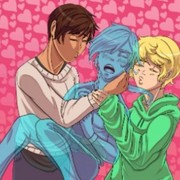He stepped outside into a storm and the expectant glare of a hundred fay-eyes.
The wind nearly lifted his cap from his head. Clouds threatened to overwhelm the moon. The dark forest surrounding the mansion-city of Cleopolis creaked and groaned. On the close-cropped grass before the mansion, the grooms of the Lordly Folk waited by the dozen, as if for a great hunting-party, trying to calm skittish horses. John did not shorten his stride at the sight of them. The moment he passed the threshold of Cleopolis, he found himself back in his smith’s clothes; he whipped out his knife and pressed on holding it clenched in his fist before him, and the fay grooms stood back to let him pass.
With the moon swallowed in darkness, John could see the forest path for no more than a few steps in front of him. But he went on confidently following the white stone borders.
When he first came to Cleopolis they had run straight as an arrow across the valley to the Queen’s house. Why, now, when he looked back, did he see lights shining fitfully through the trees to his left? The curve must have been so gradual he never saw it in the gloom, but certainly there should be a long straight path behind him, and small and far-off the door of the house.
He didn’t stop moving, but his steps slowed. He was yet far from home, and he no longer had Sir Thomas Lene to guide him.
Presently the path forked. On the journey to Cleopolis, there had been no forks in this path. John knew he was lost, or being toyed with, but he took the right-hand turn and went on in the dark, hoping to get further away from the house. The path forked twice more and each time he took the right-hand arm, but at last, among the trees ahead, lights pricked out of the darkness. John stopped with a falling heart, and then went on in faint hope.
As he expected, he had come back to the house.
He forced himself not to think too far ahead. He turned and retraced his steps to the previous fork, and took the other path. That led him for so far without a fork that he began to hope; then, just as he thought he might at last be getting free of Cleopolis, it turned and ran up a short slope to let him out at the back of the mansion.
When the third path ended back at the house, John lost patience. This time he dispensed with the white stones. Instead he marked a pale blaze in a tree with his knife and set out on a direct line-of-sight away from the lights. It was a laborious way of proceeding, for he could not see far in the dark, and in the shin-barking undergrowth it was difficult to follow a straight line. Presently he heard a great rush of hooves and the winding of horns as a host of riders passed in the distance. Around him the wood groaned in the wind, and now and again he heard a branch crash to the ground behind him or saw eyes glowing in the fitful moonlight. But none of these things frightened him so much as the thought of being lost forever in Faerie.
The lights of Cleopolis faded away behind him. He crossed no paths. He did not come again to the house.
And though he walked further than he thought possible, until the time he had spent in the great hall of Cleopolis faded into the distance of his memory, he did not find his way out of the valley.
The storm died from a gusty howl to a spent wail. How long had this night lasted? John stopped at last, drove his blunted knife back into its sheath, and lowered himself to the ground with his back against a tree. He must rest. Horse had not availed him, charms had not availed him, and now even Faerie had failed him. He had squandered his time in seeking help where no help would be given, and now he was trapped more surely than if he had gone to stand in spell-woven stillness under the Dark Tower.
For now he was certain the sun would never rise over Cleopolis.
“’Tis only in the borderlands that the rising sun will return you to mortal lands”—those were Sir Thomas’s words. He had not taken them to mean that there would be no sunrise at all.
If only he had a guide! If only he had stopped to ask Sir Thomas’s help! –And then he jolted upright, remembering the grey fay-woman with whom he had danced.
“Columbell!” He did not know how loudly to call, or what might answer his call from the dark depths of the wood. “Columbell! Columbell!”
He paused to listen, holding his breath, straining his eyes through the darkness.
She must not have heard him. She did not come. Not even after he had counted to a thousand and given up.
John closed his eyes and let his head fall back against the rough bark of the tree behind him.
Had he in truth nearly drunk the fay wine? He broke into a cold sweat. What must have possessed him, to think of it? Two hundred years? An evening was more than he could stand. Yet this was many-spired Cleopolis, no noisome prison. What must Janet be suffering, trapped in the Dark Tower, without even the hope of escape?
Another wave of homesickness swept over him. No, not homesickness, for now it was not the Dale that tugged at him; it was Janet. A woman with eyes that were neither cold, like Gloriana’s, nor dead, like Columbell’s. Valour and joy and grace with no grotesquery lurking behind it. After so long in the dark heart of Faerie, she seemed a light unattainably far away from him.
And yet, now he came to think of it, it had been in his mind to offer her her freedom when he found her again. Why had he thought such a thing? Because perhaps they would find happiness more easily apart than together? Even if that were true, after so much weary toil, could he bring himself to give up the prize once she had been won?
Besides, the banns had been read.
He had fallen into a restless doze when some way off a voice began to sing. The air was plaintive and piercing, cutting through the dark like a ray of light. He did not know the tune, but when it resolved into words, they were very like the song Thomas Lene had sung in the faerie market.
He bare him up, he bare him down,
He bare him into an orchard brown.
Lully, lullay, lully, lullay!
The falcon hath borne my mate away.
In that orchard there was an hall
That was hanged with purple and pall.
And in that hall there was a bed:
It was hanged with gold so red.
Lully, lullay, lully, lullay!
The falcon hath borne my mate away.
And in that bed there lieth a knight,
His woundis bleeding day and night.
By that bed’s side there kneeleth a may,
And she weepeth night and day.
Lully, lullay, lully, lullay!
The falcon hath borne my mate away.
And by that bed’s side there standeth a stone,
Rosa Mundi written thereon.
Lully, lullay, lully, lullay!
The falcon hath borne my mate away.
John followed the song half in a daze, but when his mind pieced together the words of the final lines, he bolted to his feet with the weariness rolling from his back. “Ho there!” he choked out, and blundered forward holding his hands before his face.
The voice fell silent.
John pulled himself back. Could he recall it?—Yes, it came back to him now. His voice was breathless and tuneless, but he flung the words desperately into the listening dark.
Down in yon forest there standeth a hall,
The bells of Paradise, I heard them ring…
The voice spoke to him. “Sir? John-a-Dale?”
“Here, lady!”
“Wait where you are and speak to me,” she called back to him.











Comments (0)
See all